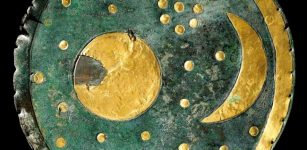Abundantia: Roman Goddess Who Was Shaking Her Gifts From Cornucopia – ‘Horn Of Plenty’
A. Sutherland - AncientPages.com - Abundantia (or Abundita) was a powerful, nourishing Roman goddess and a divine personification of abundance, prosperity, and good fortune. She was believed to be the one who formally assured abundant harvest.
 A silver statue of Abundantia. Musée Gallo-Romain, Lyon. source
A silver statue of Abundantia. Musée Gallo-Romain, Lyon. source
In Roman mythology, the goddess brought money and grain to people as they slept, shaking her gifts from the Horn of Plenty she was constantly carrying.
Personifications in Roman mythology played an important role and were a typical characteristic feature of the Roman religion. The ancient Romans personalized and worshiped human feelings, desires, moral concepts, and qualities such as hope, truth, fidelity, and more.
Roman personifications often appeared on the sides of Roman coins (especially those dated to the time of the Roman Empire). Characters from the Roman pantheon of deities were often used as idols.
The name 'Abundantia' literally means "overflowing wealth," her symbol is the cornucopia, symbolizing boundless abundance, often depicted in paintings and on friezes. The goddess was frequently described as a beautiful woman who spills the grain out of the cornucopia, the horn of plenty. It is a hollow horn-shaped container with things like fruit, coins, flowers, nuts, or other desirable things.
According to the Greek legend, Zeus accidentally broke a horn from the divine she-goat Amalthea, his foster mother, frequently mentioned in myths. He gave it to Amalthea, promising that it would supply whatever she desired in abundance, and so it happened. The horn would overflow with all good food, drink, and other riches.
In another version, the sacred goat filled the horn with flowers and fruits and gave it to Zeus, who placed the horn of plenty together with the goat, Amalthea, amongst the stars.
Abundantia has always been considered a beautiful goddess who brings success, prosperity, and good fortune to everyone she meets. She is the protector of investments, savings, and wealth.
 Left: Abundantia frequently appeared on Roman imperial coinage. source ; Right: Abundantia by Antonio Tarsia San Zanipolo Venice. source
Left: Abundantia frequently appeared on Roman imperial coinage. source ; Right: Abundantia by Antonio Tarsia San Zanipolo Venice. source
She can bring people to a place of acceptance, joy, and grace. In our modern society, the goddess remains the patron of gamblers – the revered 'Lady Fortune.'
Cornucopia Was Granted To Abundantia
A myth by Ovid (43 BC- 18 AD), a Roman poet who lived during the reign of Augustus, describes the Achelous, the god of all water and the world's rivers.
During one of Heracles' (Roman Hercules) missions to fight with Achelous, Heracles broke off one of his horns. The Naiads (freshwater nymphs) took up the horn and changed into the cornucopia granted to Abundantia.
It was with this 'horn of plenty' that she distributed food and money.
Abundantia Depicted On Roman Coins
Within Roman mythology, she was considered a minor deity, and there are only a few temples or signs of worship for the goddess Abundantia to be recognized in Rome.
Her personification, however, was frequently seen on the reverse of Roman imperial coinage, and she has been widely featured in art.
Beliefs In the Great Power Of Abundantia
The beautiful goddess can help us become recipients of divine gifts. She also gives us faith and the opportunity to follow our dreams and aspirations.
In Roman mythology, Abundantia gives money and grain from her cornucopia to people during sleep. In ancient Rome, it was believed that she entered the homes of people during the night,
She is a merciful and generous goddess who loves looking at human joy and listening to words of gratitude. She encourages us to turn to her in financial problems because she will gladly show us the way to the source of everything.
She wants us to be free from financial worries and have a comfortable life. She asks us not to fall into a paralyzing fear in the face of losses or lack of money because it blocks the flow of energy we need in our lives.
Updated on January 5, 2024
Written by – A. Sutherland - AncientPages.com Senior Staff Writer
Copyright © AncientPages.com All rights reserved. This material may not be published, broadcast, rewritten or redistributed in whole or part without the express written permission of AncientPages.com
More From Ancient Pages
-
 Oxford University Is Older Than The Aztec Empire – Historical Records Say
Ancient History Facts | Dec 5, 2017
Oxford University Is Older Than The Aztec Empire – Historical Records Say
Ancient History Facts | Dec 5, 2017 -
 10 Ancient Celtic Symbols Explained
Ancient Symbols | Sep 9, 2023
10 Ancient Celtic Symbols Explained
Ancient Symbols | Sep 9, 2023 -
 Namoratunga: ‘People Of Stone’ And Ancient Astronomical Observatory
Featured Stories | Jun 12, 2016
Namoratunga: ‘People Of Stone’ And Ancient Astronomical Observatory
Featured Stories | Jun 12, 2016 -
 Mysterious Ancient ‘Triangle Code’ And Curious Markings Discovered On Vessels In Israel Reveal Something Interesting
Archaeology | Feb 11, 2019
Mysterious Ancient ‘Triangle Code’ And Curious Markings Discovered On Vessels In Israel Reveal Something Interesting
Archaeology | Feb 11, 2019 -
 Riddle Of An Ancient Underground City No-One Thinks Exist – Have We Misunderstood Plato? Part 1
Featured Stories | Sep 16, 2019
Riddle Of An Ancient Underground City No-One Thinks Exist – Have We Misunderstood Plato? Part 1
Featured Stories | Sep 16, 2019 -
 Sacred Regalia Of Japanese Emperor: Sword, Mirror And Jewel In Ancient Japanese Tradition
Artifacts | Sep 2, 2017
Sacred Regalia Of Japanese Emperor: Sword, Mirror And Jewel In Ancient Japanese Tradition
Artifacts | Sep 2, 2017 -
 On This Day In History: Mount Fuji Erupted – On Dec 16, 1707
News | Dec 16, 2016
On This Day In History: Mount Fuji Erupted – On Dec 16, 1707
News | Dec 16, 2016 -
 16 Dead Sea Scrolls Fragments Are Forgeries – U.S. Bible Museum Says
Artifacts | Mar 15, 2020
16 Dead Sea Scrolls Fragments Are Forgeries – U.S. Bible Museum Says
Artifacts | Mar 15, 2020 -
 Change Of Burial Tradition Among The People of Early Medieval Europe
Archaeology | Aug 6, 2021
Change Of Burial Tradition Among The People of Early Medieval Europe
Archaeology | Aug 6, 2021 -
 Hiawatha And The Legendary Great Peacemaker – Native American Heroes Who Founded The League Of The Iroquois
Featured Stories | Feb 25, 2019
Hiawatha And The Legendary Great Peacemaker – Native American Heroes Who Founded The League Of The Iroquois
Featured Stories | Feb 25, 2019 -
 Resourceful Neanderthals Could Dive 13ft If Necessary To Collect Shells
Archaeology | Jan 16, 2020
Resourceful Neanderthals Could Dive 13ft If Necessary To Collect Shells
Archaeology | Jan 16, 2020 -
 Hippocrates Didn’t Write The Oath, So Why Is He The Father Of Medicine?
Featured Stories | Oct 7, 2015
Hippocrates Didn’t Write The Oath, So Why Is He The Father Of Medicine?
Featured Stories | Oct 7, 2015 -
 Remains Of Aztec Palace That Belonged To Axayacatl, Father Of Montezuma Unearthed In Mexico City
Archaeology | Jul 18, 2020
Remains Of Aztec Palace That Belonged To Axayacatl, Father Of Montezuma Unearthed In Mexico City
Archaeology | Jul 18, 2020 -
 Nebra Disc – Artifact That Represents 3,600-Year-Old Astronomical Knowledge
Artifacts | May 26, 2014
Nebra Disc – Artifact That Represents 3,600-Year-Old Astronomical Knowledge
Artifacts | May 26, 2014 -
 Brahma: First God In Hindu Trimurti, Creator Of The World And All Creatures
Featured Stories | Apr 17, 2019
Brahma: First God In Hindu Trimurti, Creator Of The World And All Creatures
Featured Stories | Apr 17, 2019 -
 Binary System Was Used By Ancient Polynesians 1,000 Years Before The Concept Of A Computer Was Introduced
Ancient Technology | Feb 3, 2015
Binary System Was Used By Ancient Polynesians 1,000 Years Before The Concept Of A Computer Was Introduced
Ancient Technology | Feb 3, 2015 -
 First European Farmers’ Heights Did Not Meet Expectations
Archaeology | Apr 8, 2022
First European Farmers’ Heights Did Not Meet Expectations
Archaeology | Apr 8, 2022 -
 Scipio Africanus – Rome’s Greatest General Who Defeated Unbeatable Hannibal
Featured Stories | Aug 5, 2021
Scipio Africanus – Rome’s Greatest General Who Defeated Unbeatable Hannibal
Featured Stories | Aug 5, 2021 -
 Intriguing Petroglyphs Reveal Traces Of A Lost Ancient Civilization In India
Archaeology | Oct 4, 2018
Intriguing Petroglyphs Reveal Traces Of A Lost Ancient Civilization In India
Archaeology | Oct 4, 2018 -
 Hengist And Horsa: Legendary Anglo-Saxon Warrior Brothers And Leaders Of First Settlers In Britain
Featured Stories | May 28, 2016
Hengist And Horsa: Legendary Anglo-Saxon Warrior Brothers And Leaders Of First Settlers In Britain
Featured Stories | May 28, 2016
